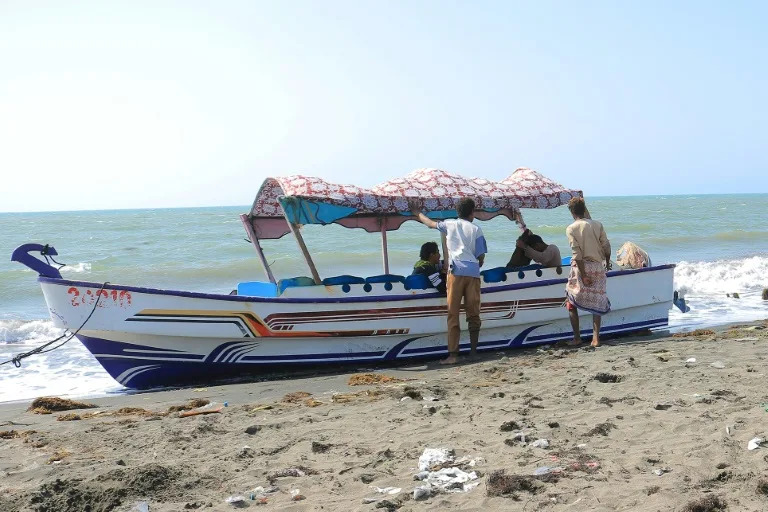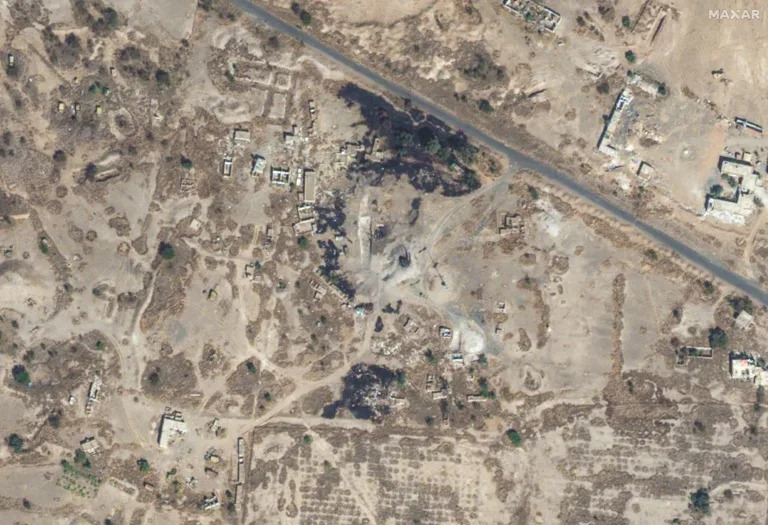Biden says the U.S. will “make sure that we respond to the Houthis” when asked for his response if they strike again.

The U.S. and U.K. on Thursday bombed sites that the Houthis use in Yemen, including weapons depots and defense radar systems.
The coalition attack was in retaliation for Houthi strikes on commercial ships in the Red Sea and the Gulf of Aden.
While doing a tour of several small businesses in the Allentown, Pennsylvania, area on Friday, President Joe Biden was asked by a reporter if the U.S. will continue with the strikes if the attacks do not stop.
“The bombing of the Houthis — if the attacks don't stop, will you continue with the strikes?” the reporter asked the president.
“We will make sure that we respond to the Houthis as they continue this outrageous behavior, along with our allies,” Biden responded.
A reporter asked the president if we are in a proxy war with Iran. “No,” the president replied. “Iran does not want to war with us.”
Biden was also asked if he has confidence in Lloyd Austin following the defense secretary’s hospitalization scandal, to which he replied: “I do.”
'Armageddon': Yemenis recount fear of US-British strikes on Huthis.

Nearly two years after the fire of Yemen's civil conflict had largely been quelled, Manal Faqirah awoke at dawn Friday to the sound of bombs raining on her coastal home city of Hodeida.
"When I heard the first blast, I was terrified, I thought it was a dream," the 36-year-old civil servant told AFP, saying she was awakened from her sleep by the strikes.
"When the second blast came, I knew this was a strike, this was war," she continued, recalling how she curled up underneath her covers at the sound of the third strike.
She said she was so afraid of the sound of bombing that it felt "like Armageddon".
Faqirah is a resident of Hodeida, a strategic port city overlooking the Red Sea that saw a large share of the strikes by US and British forces targeting Huthi rebels over their attacks on shipping.
The Huthis have launched a series of attacks on vessels suspected to have links to Israel in a bid to push for a ceasefire in the war that has raged in the Gaza Strip for more than three months.
"I thought about the children and mothers and fathers. Who is being struck?... I feared for my country, for my family members," Faqirah said.
Hodeida province, whose seaports are a lifeline for millions in the Huthi-controlled parts of Yemen, is a key launch site for rockets and drones targeting Red Sea shipping.
The rebels have also been holding the Galaxy Leader, a merchant vessel linked to an Israeli businessman that was seized on November 19, at Salif Port, north of the city.
- 'Nowhere to hide' -
Pharmacist Assem Mohamed, 33, was awoken at 2:30 am by the sound of not only the blasts but the cries of his child.
"When the strikes hit, my youngest son awoke crying in fear and screaming 'firecrackers'," the father of three said. At first, he "thought there was a wedding in the alley".
The three-year-old boy was too young to remember the days of fierce fighting in Hodeida between a Saudi-led coalition and the Huthi rebels.
Saudi Arabia intervened in Yemen in 2015 on behalf of the internationally recognised government against the Iran-backed Huthi rebels who had overrun the capital Sanaa the previous year.
The war raged for years, killing hundreds of thousands and resulting in what is dubbed by the United Nations as the world's worst humanitarian crisis, but a ceasefire has largely held since April 2022.
"There is nowhere to hide... but we all gathered in one room," Mohamed said, adding that he did not really expect the West to follow through with their threats to strike the rebels.
The sound of the strikes revived memories of the bloody war that for years gripped the Arab Peninsula's poorest country.
"When the strikes hit, we didn't know they would only target military sites. We thought they would target everywhere as it was in the past nine years," Mohamed said.
- 'We don't want wars' -
Faqirah told AFP that her husband's friend lives in the capital Sanaa, another city targeted by the US and British strikes.
When they called to check on them, he told them "Sanaa is burning".
Faqirah fears returning to the battles that gripped the country for years after the return to relative normality over the past two years.
"God willing, the war will not return. Our hope in this world is to live in health and peace," she said.
But Mohamed is less optimistic.
"The situation is very tense and the next days do not bode well," he said, pointing to the Huthis' vows to respond to Washington and London.
Yemenis -- grown accustomed to preparing for crises by stocking up on food and supplies -- began forming queues on Friday at petrol stations in Hodeida and Sanaa before eventually dispersing, AFP correspondents reported.
The cooking gas company in Sanaa said it was "continuing to provide citizens with their needs", calling on residents to report back on any outlets that had interrupted supplies or raised prices.
On Saturday morning, rebel forces in north Sanaa had imposed strict security measures around Al-Dailami airbase, which was targeted with fresh strikes at dawn, an AFP correspondent said.
The surrounding area was shut and no one was allowed to enter except residents with permits from neighbourhood chiefs. Glass was scattered around the buildings surrounding the base, with some residents having fled to areas considered to be safer.
But across Sanaa, business had largely resumed as usual.
Paediatrician Yousra Sanan, 30, said: "We weren't very scared of the strikes because we've grown used to these sounds for years."
But she added: "We want to live in safety and stability. We don't want wars."
UN chief warns against escalation after US-UK strikes on Huthis

United Nations Secretary-General Antonio Guterres called on all sides "not to escalate" the volatile situation in the Red Sea, his spokesman said on Friday after Washington and London launched strikes on Yemen's Huthi rebels.
The barrage of strikes early on Friday against the Huthis, who say they are acting in solidarity with Gaza, follow weeks of disruptive rebel attacks on Red Sea shipping and have stoked fears of the Israel-Hamas war spreading regionwide.
"The Secretary-General further calls on all parties involved not to escalate even more the situation in the interest of peace and stability in the Red Sea and the wider region," said Guterres' spokesman Stephane Dujarric.
Later, Khaled Khiari, Assistant Secretary-General for the Middle East, told the UN Security Council "we are witnessing the cycle of violence that risks grave political security, economic and humanitarian repercussions in Yemen and the region."
"These developments in the Red Sea and the risk of exacerbating regional tensions are alarming," he said.
Russia's ambassador to the UN called the joint US-UK strikes on Yemen's Huthis "blatant armed aggression against another country."
"These states all carried out a mass strike on Yemeni territory. I'm not talking about an attack on some group within the country but an attack on the people of the country on the whole. Aircraft were used, warships and submarines," Vasily Nebenzya said of the US and British action, supported by allied countries.
But Washington's ambassador to the UN Linda Thomas-Greenfield warned that no countries' vessels were immune to the threat posed by Huthi rebels to shipping in the Red Sea.
"Whether your ship flies an American flag, or the flag of another nation... all of our ships are vulnerable," she said.
"Without Iranian support, in violation of their obligations... the Huthis would struggle to effectively track and strike commercial vessels, navigating shipping lanes through the Red Sea."
Britain's ambassador to the UN Barbara Woodward said London "took limited, necessary and proportionate action in self defense."
"This operation took particular care to minimize risks to civilians," she said.
- Questions and Answers
- Opinion
- Story/Motivational/Inspiring
- Technology
- Art
- Causes
- Crafts
- Dance
- Drinks
- Film/Movie
- Fitness
- Food
- Παιχνίδια
- Gardening
- Health
- Κεντρική Σελίδα
- Literature
- Music
- Networking
- άλλο
- Party
- Religion
- Shopping
- Sports
- Theater
- Wellness
- News
- Culture
- War machines and policy

